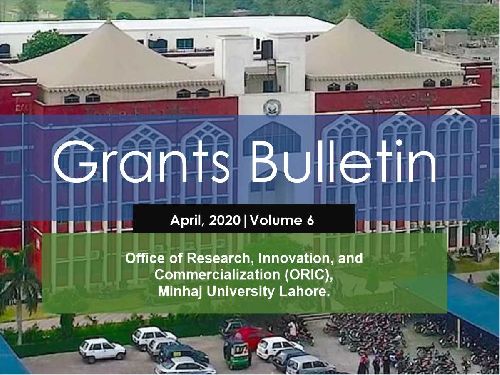Grants Bulletin
- April 16, 2020
The Roddenberry Prize seeks to highlight extraordinary organizations and support their efforts towards greater impact; seek out creative approaches from diverse members of our global community; and inspire others to take innovative and creative approaches to global problems. Four awards of $250,000 will be granted to organizations working in the areas of Education, Environment, Science, or Humanity. In addition to the four $250,000 awardees, up to five organizations in each field will be recognized publicly as Prize Finalists. Criteria for the Prize are innovativeness, potential for impact, vision, and track record.
Priority Areas
1. Education
2. Environment
3. Science
4. Humanity
In the face of an unprecedented challenge, the World Tourism Organization (UNWTO), with the support of the World Health Organization (WHO), calls on innovators and entrepreneurs to put forward new solutions to help the tourism sector recover from COVID-19. The winners of the Healing Solutions for Tourism Challenge will be invited to pitch their ideas to representatives of more than 150 governments and will also enjoy access to the UNWTO Innovation Network.
Priority Areas
1. Economics
2. Sciences
Elrha is launching an urgent funding call for research proposals to support the COVID-19 response in humanitarian settings.The call aims to fund public health research that will produce robust findings that will contribute to the effectiveness of the current humanitarian response and increase the evidence base for future responses to similar infectious disease outbreaks.
Priority Areas
1. Social Sciences
2. Healthcare Delivery
3. Computer Sciences
Antler’s Call for Start-Ups Tackling COVID-19 aims to contribute towards the path recovery from the crisis. Antler is inviting startups to propose solutions in mitigation (e.g. masks, contact tracing, surveillance, data infrastructure), medical equipment (e.g. test kits, protective devices, ventilators), remote health (e.g. telehealth, remote patient monitoring, symptom checkers), and digital tools (e.g. remote work, smart delivery, e-learning).
Priority Areas
1. Engineering
2. Computer Sciences
3. Health Sciences
The British Society for Antimicrobial Chemotherapy’s COVID-19 Funding Call supports researchers in better understanding and addressing COVID-19 outbreak. These awards are for groups of researchers who want the time and resources to shape the direction of their future work. The development programmes will lay the foundation for research that takes risks and pushes academic boundaries.
Priority Areas
1. Health Sciences
2. Computer Science
The Transform Fund Call for Innovation 2020 will focus entirely on supporting the Islamic Development Bank’s Member Countries long-term preparedness and response to the COVID-19 pandemic. Interests include the adaptation of advanced technology, innovative health supply chain management systems, development of low-cost rapid tests and screening methods, and capacity building interventions.
Priority Areas
Open from 1 April 2020, the Call for Innovation will identify, encourage and reward innovative proposals that will benefit local communities focused on the following
1. The application of advanced technology
2. Innovative health supply chain management systems
3. Development of Low-cost rapid tests and screening methods
4. Capacity building interventions
MIT Solve is seeking tech innovations that can slow and track the spread of an emerging outbreak, for example by improving individual hygiene, developing low-cost rapid diagnostics, analyzing data that informs decision making, and providing tools that protect health workers. Solve is also seeking solutions that focus on preventative and mitigation measures that strengthen access to affordable primary healthcare systems, enhance disease surveillance systems, and improve healthcare supply chains.
Priority Areas
1. Engineering
2. Computer Sciences
3. Health Sciences
4. Economics
The Call for Code Global Challenge, an initiative of IBM, asks the world's developers to build solutions for COVID-19 and climate change. Interests include crisis communication, remote education, and community cooperation.
Priority Areas
1. Engineering
2. Computer Sciences
The COVID-19 Solutions Fund provides awards of up to $50,000 each to open source technology projects which are responding to the COVID-19 pandemic in some way. Applications will be accepted for hardware (e.g., an open source ventilator), software (e.g., a platform that connects hospitals with people who have 3D printers who can print parts for that open source ventilator), as well as software that solves for secondary effects of COVID-19 (e.g., a browser plugin that combats COVID related misinformation).
Priority Areas
1. Engineering
2. Computer Sciences
The National Geographic Society is launching an emergency fund for journalists all over the world who wish to cover COVID-19 within their own communities. The Fund will distribute support ranging from $1,000 to $8,000 for local coverage of the preparation, response, and impact of this global pandemic as seen through evidence-based reporting. Eligible applicants include writers, photographers, videographers, audio journalists, cartographers, filmmakers, and data visualization experts.
Priority Areas
1. Languages
2. Journalism
3. Mass Communication
Peace First’s COVID-19 Rapid Response Grants is a rapid response coaching and grant process to help young people around the world lead projects that address community impacts of COVID-19, from providing meals to elderly neighbors to launching digital mental health campaigns to support youth feeling isolated. Rapid response grants are open to young people between the ages of 13-25, anywhere in the world.
Priority Areas
1. Mass Communication
2. Psychology
The Pulitzer Center on Crisis Reporting is seeking proposals that develop innovative approaches to reporting on the novel coronavirus crisis using collaboration among journalists and newsrooms across state lines or national borders. Priority is given to proposals that focus on systemic, under-reported issues underlying the coronavirus crisis; use data-driven or interdisciplinary approaches to reporting on coronavirus; and hold the powerful accountable. This opportunity is open to all newsrooms and independent journalists in the United States and abroad.
Priority Areas
1. Mass Communication
The Community Prototype Fund supports the rapid development of innovative, viable and open Internet freedom technology prototypes that serve the immediate needs of the Internet freedom and human rights communities. Through short-term support, technologists and activists can bring to life nascent ideas that help advance inclusive and safe access to global communications networks,counteract censorship and surveillance, and mitigate digital security threats to Internet freedom, specifically in repressive environments.
Priority Areas
1. Digital Security
2. Internet Freedom
